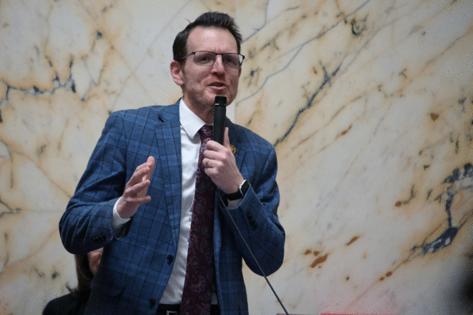Blueprint passes the Maryland Senate but not without discussion on trans athletes
Published in News & Features
BALTIMORE — The Senate gave final approval Tuesday evening to a bill to amend the Blueprint for Maryland’s Future — but not without addressing a controversial amendment regarding transgender children in sports.
“We want to protect the crucial role that women’s sports have played in the development of young women for a long time — but, particularly, over the last 50 years since Title IX came into being,” Senate Minority Whip Justin Ready, a Republican representing Carroll and Frederick counties, said.
The Senate approved both cross-files of Gov. Wes Moore’s bill intended to reduce spending on the state’s landmark Blueprint for Maryland’s Future education reform program Tuesday.
But, before that could be done, Ready attempted to amend the House version to include a measure that would only allow people born as biological women to participate in girls’ high school interscholastic, intramural or junior varsity sports that are designated as female teams.
The Senate version of the Blueprint bill, Senate Bill 429, passed without Ready attempting to amend it, and mostly along party lines.
Ready said he was motivated to introduce the amendment because he has a pre-teen daughter interested in soccer, and his wife did track and field at Salisbury University.
“Women have fought long and hard to earn equal athletic opportunities — I don’t have to tell that to the women I know in this room,” he said. “Title IX was a real revelation that has brought about needed and positive changes since 1972.”
The amendment was modeled on a policy introduced in a bill brought by Sen. Mary Beth Carozza, an Eastern Shore Republican.
Ready pointed specifically to women’s basketball, volleyball, and track and field.
“There’s a reason for those distinctions,” he said. “And we’ve seen it play out where there have been tremendous negative side-effects to allowing people who are not biologically female to go into those spaces.”
Ready referenced Payton McNabb, who was hit with a ball during a volleyball game by a transgender athlete. Multiple reports allege McNabb was left with a concussion and neck injury after the incident.
President Donald Trump invited McNabb to attend his joint address to Congress earlier this year.
“Of course, all student athletes face the potential of injury,” Ready said. “But when we knowingly put women — young women — in harm’s way against much more biologically stronger people, who should not be participating with biological women in a women’s sport, we put them in physical danger.”
Carozza said that, from her experience as a high school tennis athlete, “being able to say you played in the number one position puts you in a better position when colleges start to look at you for possible scholarship opportunities.”
“I do know that … if I had been bumped from playing that number one position in high school — perhaps by a biological male who was stronger than me — that that would have affected the scholarship I received.”
Carozza said that, while listening to the opposition to the bill, she “saw the emotion on the other side” as they contended that the bill would be discriminatory.
“That could not be further from the truth, because trans athletes can play boys’, co-ed and intramural sports. Allowing biological boys to play girls’ sports discriminates against biological girls, and I believe Maryland girls deserve to play girls’ sports on an even playing field, and that’s the only reason this is being offered.”
Sen. Mary Washington, a Baltimore Democrat, said she’s “very familiar being in a room or a body making decisions” about her life or the people she loves who “may not have had those experiences themselves.”
Washington, who is openly gay, said she “is mindful” that the debates the General Assembly has had over the years to ensure equality “is something that takes time” and “the voices of people impacted and their allies.”
“I stand recognizing that, relative to my tansgender brothers and sisters and others, that I exercise privilege in that the body that I was born in, that I live in, that I’m comfortable in is the one that others see, and that I don’t experience any discrimination based on that, so I feel an obligation and an opportunity, which really comes where I can speak as a privileged class,” she said.
Washington shared the testimony of a Maryland student who experienced discrimination as the only girl on a co-ed soccer team and tried “to play with boys” in middle school gym class. The testimony detailed the discrimination she faced while playing sports designated for female teams.
“Sexism is an issue that is so much bigger than your assigned gender at birth,” Washington read. “It is an issue of perception. Women are perceived as less successful and weak, causing them to get lower scores and less funding, as well as less respect.”
The testimony said that such legislation allows people to question women’s bodies for being too tall, too fast and “fair game.”
“In not allowing transgender girls to participate in women’s sports, we continue a long history of allowing people to police women’s bodies,” Washington read.
As the chamber voted on the amendment, Senate President Bill Ferguson, a Baltimore Democrat, said that he remembered “as a straight white male … how difficult it was being a teenager and how hard it was, and just how difficult it was with no other barriers in front of him.
“When I’ve had conversations with transgendered young people who are trying to find themselves and live in a community, the pain and suffering that so many of them have felt feeling out-of-place and not having a spot in this world, is unbelievably painful,” he said
The amendment was rejected, and the bill passed on a party-line vote. Members of both chambers will now negotiate the final bill in a conference committee.
_____
©2025 The Baltimore Sun. Visit at baltimoresun.com. Distributed by Tribune Content Agency, LLC.







Comments